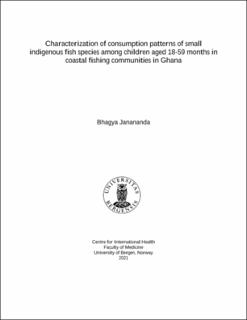| dc.contributor.author | Janananda, Mangappulige Don Bhagya | |
| dc.date.accessioned | 2021-06-25T00:19:49Z | |
| dc.date.available | 2021-06-25T00:19:49Z | |
| dc.date.issued | 2021-06-02 | |
| dc.date.submitted | 2021-06-24T22:01:15Z | |
| dc.identifier.uri | https://hdl.handle.net/11250/2761250 | |
| dc.description | Revised version. Minor changes made. | |
| dc.description.abstract | Even though there is some progress towards Sustainable Development Goals (SDGs) during the past decades in Ghana, malnutrition due to poor diets remains an unresolved challenge with significant inequalities, especially among children under five years of age. This master's project is affiliated to the SmallFishFood project, which focuses on various aspects of fisheries and aquaculture in Ghana. The study involved a remotely supervised, descriptive, cross-sectional study to assess the nutritional status and dietary patterns among 385 children aged 18-59 months and caregiver perception on fish-food security. Different variables were generated from the quantitative data collected using a structured questionnaire. The MUAC screening identified a very low prevalence of malnutrition of 0.5 percent with MUAC less than 12.5 cm, and 78 percent of the children had an adequately diversified diet based on the Dietary Diversity Score (DDS). More than 40 different marine fish species were consumed across the four coastal regions and the majority of the children preferred the fish fried or smoked. The Likert scale analysis revealed that the majority of the caregivers have a positive perception on small fish of good quality being readily available throughout the year. The study also provided some insights into how the Covid-19 pandemic has affected the community, where about 70 percent of the caregivers stated that their household fish consumption was negatively affected by the pandemic. Finally, the study shows that the studied communities are frequent consumers of small fish with a positive attitude towards adding small fish into the diets of children. Therefore, we suggest that interventions should be focused on establishing sustainable harvesting, processing and distribution methods to facilitate a stable supply of small fish throughout the year as they are preferred mainly by the children in these communities. If a similar relationship between low prevalence of malnutrition and frequent small fish consumption is confirmed by future studies, the dietary pattern of these fishing communities could be adapted to combat malnutrition in other communities with a high prevalence of malnutrition. This would be a step towards achieving food security in Ghana in particular and other parts of sub-Sharan Africa facing similar nutritional challenges in general. | |
| dc.language.iso | eng | |
| dc.publisher | The University of Bergen | |
| dc.rights | Copyright the Author. All rights reserved | |
| dc.subject | Small Fish Consumption | |
| dc.subject | Child Nutrition | |
| dc.subject | Ghana | |
| dc.title | Characterization of consumption patterns of small indigenous fish species among children aged 18-59 months in coastal fishing communities in Ghana | |
| dc.type | Master thesis | |
| dc.date.updated | 2021-06-24T22:01:15Z | |
| dc.rights.holder | Copyright the Author. All rights reserved | |
| dc.description.degree | M.Phil. in Global Health - Thesis | |
| dc.description.localcode | INTH395A | |
| dc.description.localcode | MAMD-GLOB | |
| dc.subject.nus | 769913 | |
| fs.subjectcode | INTH395A | |
| fs.unitcode | 13-26-0 | |
